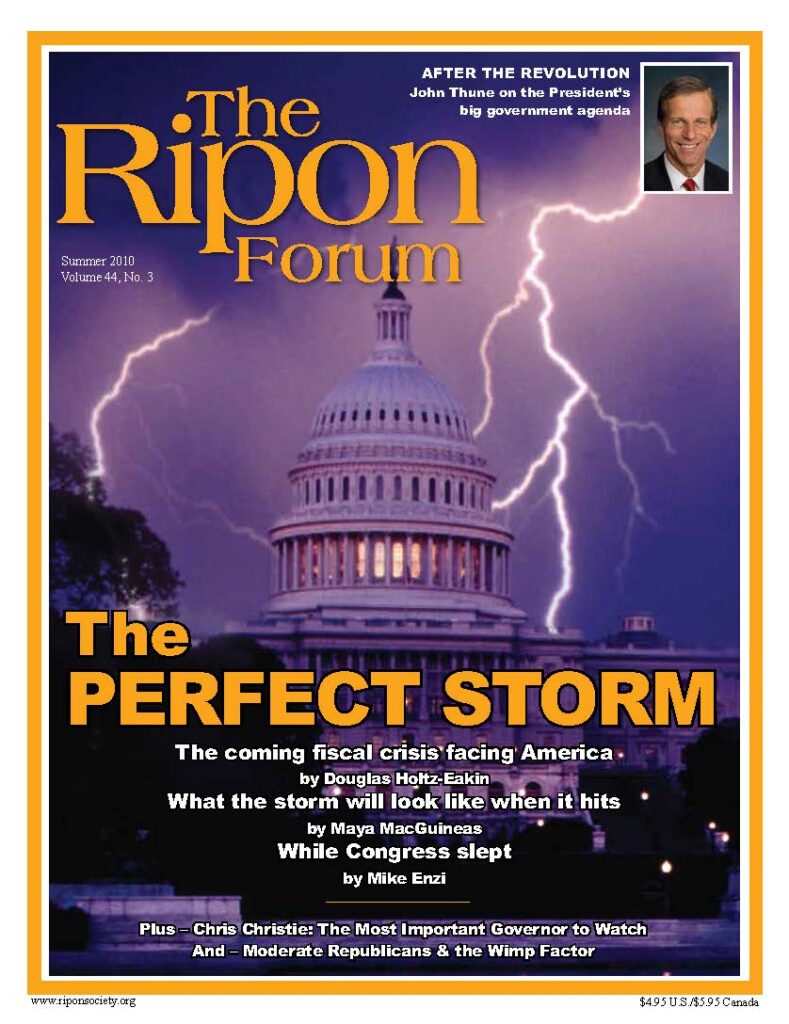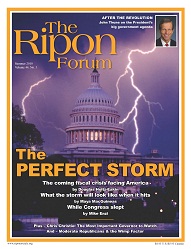Ripon Forum Looks at Coming Fiscal Crisis Facing America with Essays by Douglas Holtz-Eakin, Maya MacGuineas & Senator Mike Enzi
Latest edition also examines why Chris Christie has become the “Most Important Governor to Watch,” and why moderate Republicans continue to have an image problem when it comes to fiscal resolve

WASHINGTON, DC – Rising debt. A runaway deficit. An aging population. And a level of entitlement spending that is spiraling out of control.
According to the latest edition of THE RIPON FORUM, these forces are coming together to create a perfect storm bearing down on America, one that may not just bring fiscal calamity to our Nation, but one that could strike sooner than we think.
“A United States fiscal crisis is now a threatening reality,” writes economist and former presidential advisor Douglas Holtz-Eakin in the lead sentence of his essay for the centrist Republican journal. “Over the next 10 years … the deficit will never fall below $700 billion. Ten years from now, in 2020, the deficit will be 5.6 percent of the GDP, roughly $1.3 trillion, of which over $900 billion will be devoted to servicing debt on previous borrowing. The U.S. will be perilously close to effectively getting a new credit card simply to pay off the old one.”
Holtz-Eakin’s assessment is echoed by Maya MacGuineas, the President of the Committee for a Responsible Federal Budget, who writes that, “a U.S. sovereign debt crisis is not nearly as remote as it was once thought to be, and as a result, a debt default is something that, while not likely, is no longer inconceivable.” If a default does occur? “Governments would be forced to stop doing things that even the staunchest libertarian might miss,” MacGuineas writes, “from sending grandma her check, to feeding and clothing the troops, to augmenting states’ costs for police, firefighters, and jails. Remember that 1980s TV movie, The Day After, which showed what the country would look like after a nuclear attack? Picture the fiscal version of that.”
In the face of this perfect storm, writes Mike Enzi, Congress is failing to act. “Where’s the budget?” the Wyoming Senator asks in his essay for the FORUM. “That’s the question every American should be asking. Congress is way past April, when the budget is supposed to be done, and the majority party has been afraid to bring the required budget to the floor. The majority leadership of this Congress is not doing something, and it’s running our country’s financial future into the ground.” Enzi, who worked as a certified public accountant prior to his election to the Senate, writes further that, “Congress can’t just sneak by without passing a budget and not expect to feel the repercussions of such inaction for many years to come … It’s not just a dereliction of duty. It’s a glaring example of Congress being asleep at the switch at the worst possible time for our Nation.”
One elected leader who is making tough calls is New Jersey Governor Chris Christie, who, according to Robert B. Ward of the Nelson Rockefeller Institute, has not just succeeded in passing a budget in a challenging fiscal environment, but has done so with bipartisan support. “Just six months into office,” Ward writes, “Christie has established himself as the most important governor to watch as states wrestle with budget woes that will require years of yet-unidentified changes in fiscal policy to resolve. He’s done it the old-fashioned way: Using the public power of the chief executive’s office to educate citizens about the causes of the problem, promoting what most voters consider common-sense solutions, and insisting that the Legislature agree to reforms that entrenched opposition previously made impossible.”
The reputation that Christie is establishing as a tough-minded fiscal reformer stands in stark contrast to the reputation moderate Republicans have had on budgetary issues over the years. “The perception of them collectively,” writes FORUM editor Lou Zickar, “is that they are soft; that they have no backbone; that when tough votes come down the pike, they head for the hills and let conservatives lead the fight.” In light of the renewed focus within GOP ranks on cutting spending and reducing the debt, Zickar argues, moderates need to do more to counter this perception. Reflecting back on the actions that former President George H.W. Bush took to confront a similar image problem 23 years ago, he writes that “moderate Republicans need to find the fiscal equivalent of a pork rind – something that will let them demonstrate their fiscal resolve and commitment to reducing the national debt.”
Other authors and essays featured in the Summer 2010 edition of THE RIPON FORUM include:
- South Dakota Senator John Thune – writing about the President’s big government agenda and the drop in support it is producing among the American people;
- Missouri Congressman Sam Graves – writing about the health care reform law enacted earlier this year and the negative impact it is having on America’s small business owners;
- Senators Bob Bennett, Kit Bond, Judd Gregg, and George LeMieux – offering up advice for their party and the Nation as they prepare to leave office at the end of the year;
- Mackenzie Eaglen of the Heritage Foundation – writing about the need for a missile defense system and how the Obama Administration has slowed the system’s development; and,
- Billy Pitts and Lou Zickar – writing about the accountability crisis facing Medicare and the fact that the annual report on the health of the system is four months late in being released.
In addition to these essays, the Summer edition of THE RIPON FORUM also includes atribute to Art Lifson, the Chairman of the Board of The Ripon Society who passed away on July 7th. And this month’s Ripon Profile takes a look at Congressman Charlie Dent of Pennsylvania’s 15th Congressional District.



